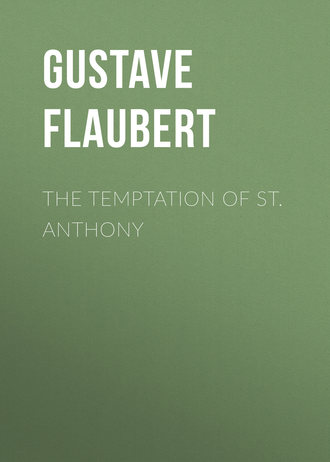
Гюстав Флобер
The Temptation of St. Anthony
[NOTE
Those who compare this translation with the original will observe the omission of some few paragraphs on pages 77, 96 and 211. They are speeches put in the mouths of certain Heresiarchs, or complaints of certain of the minor Roman household gods. The translator relegated these to an addenda, which the publishers have omitted as being unnecessary. Those who are familiar with the original will be able to supply them, and will realize that while they might be offensive to some persons, they are in no respect an integral or important part of the great drama.]
(added by transcribers)
ADDENDA
A. Observation of Manes, pages 82-3, original text; page 89 of translation.
Manes
Ou plutôt, faites si bien qu'elle ne soit pas fécondes. Mieux vaut pour l'ame tomber sur la terre que de languir dans des entraves charnelles.
Probably a calumny against Manes; for the Eastern philosophy, especially that of Zoroaster, which is said to have inspired the tenets of Manichæism, advocated no such abominations.
B. Page 105 of original; page 108 translation. The realistic phraseology of the original passage is rather brutal. The French text reads: "Il souffrait de la maladie Bellerephontienne; et sa mère, la parfumeuse, s'est livrée à Pantherus, un soldat Romain, sur des gerbes de mais, un soir de moisson." C. Descriptive text, page 237 original, partly suppressed on page 223 translation: "Et il lui montre dans un bosquet d'aliziers Une Femme toute nue, à quatre pattes comme une bête, et saillie par un homme noir, tenant dans chaque main un flambeau."
D. Curious text of Crepitus, on page 228, pages 241-3 of original:
Crepitus
( – se fait entendre):
Moi aussi l'on m'honora jadis. On me faisait des libations. Je fus un Dieu!
L'Athénien me saluait comme un presage de fortune, tandis que le Romain dévot me maudissait les poings levés et que le pontife d'Egypte, s'abstinant des fèves, tremblait à ma voix et pâlissait à mon odeur.
Quand le vinaigre militaire coulait sur les barbes non rasées, qu'on se régalait de glands, de pois, et d'oignons crus, et que le bouc en morceau cuissait dans le beurre rance des pasteurs, sans souci du voisin, personne alors ne se gênait. Les nourritures solides faisaient digestions retentissantes. Au soleil de la campagne les hommes se soulageaient avec lenteur.
Ainsi, je passais sans scandale, comme les autres besoins de la vie, comme Mena, tourment des vierges, et la douce Rumina qui protège le sein de la nourrice, gonflé, des veines bleuâtres. J'étais joyeux. Je faisais rire. Et se dilatant d'aise à cause de moi, le convive exhalait toute sa gaieté par les ouvertures de son corps.
J'ai eu mes jours d'orgeuil. Le bon Aristophane me promena sur la scène, et l'empereur Claudius Drusus 29 me fit asseoir à sa table. Dans les laticlaves des patriciens j'ai circulé majestueusement! Les vases d'or, comme des tympanons, resonnaient sous moi; et, quand plein de murènes, de truffles, et de pâtés, l'intestin du maître se dégageait avec fracas, l'univers attentif apprenait que César avait diné!
Mais à présent, je suis confiné dans la populace 30 et l'on se récrie, même à mon nom!
Et Crepitus s'éloigne, en poussant un gémissement…
E. For descriptions of the Martichoras and other monsters, appearing page 287 in the original and 253 in the translation, see also Rabelais' Pantagruel, Book V, Chap. XXX.


